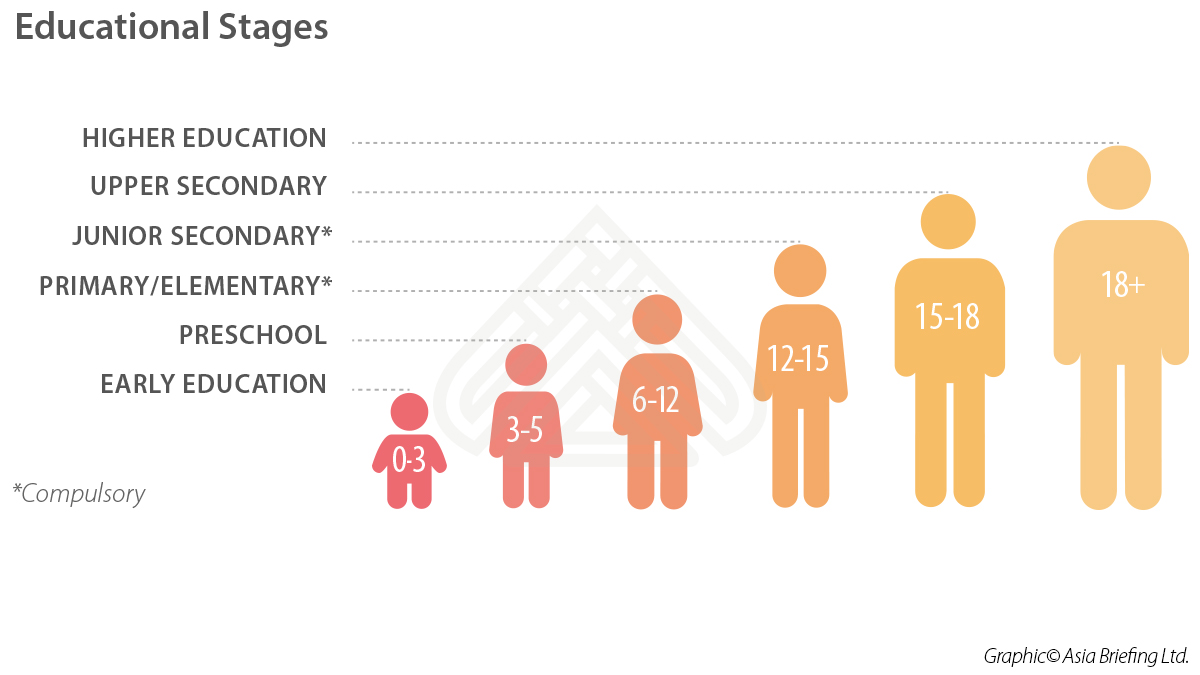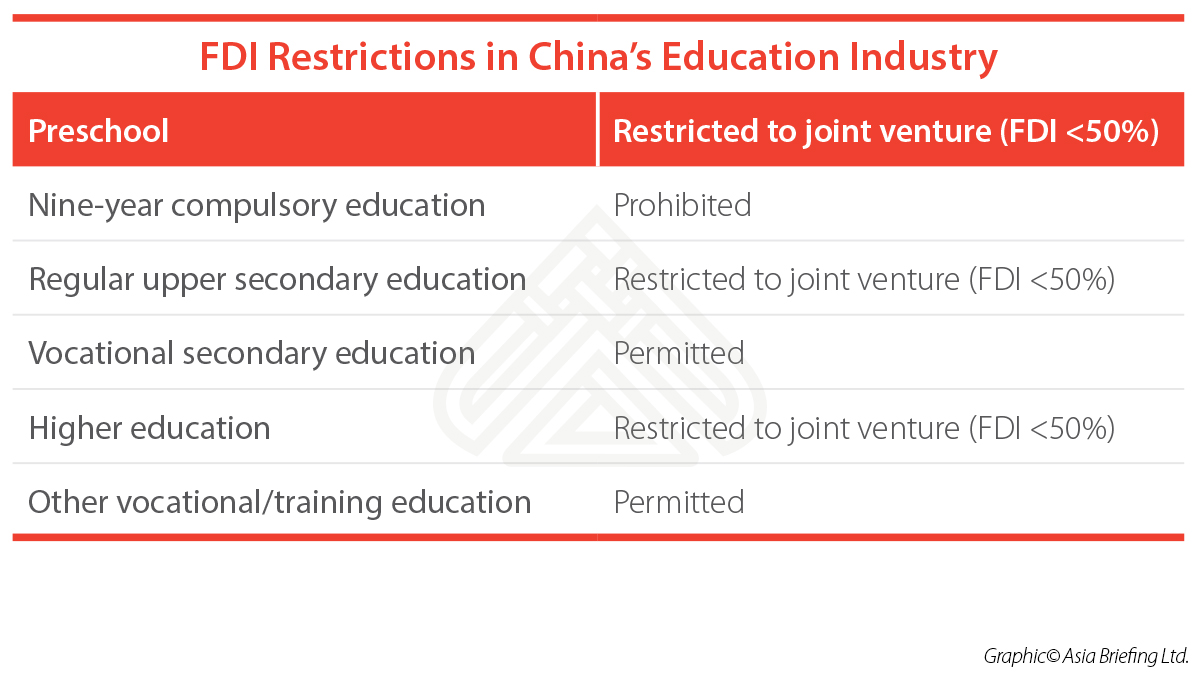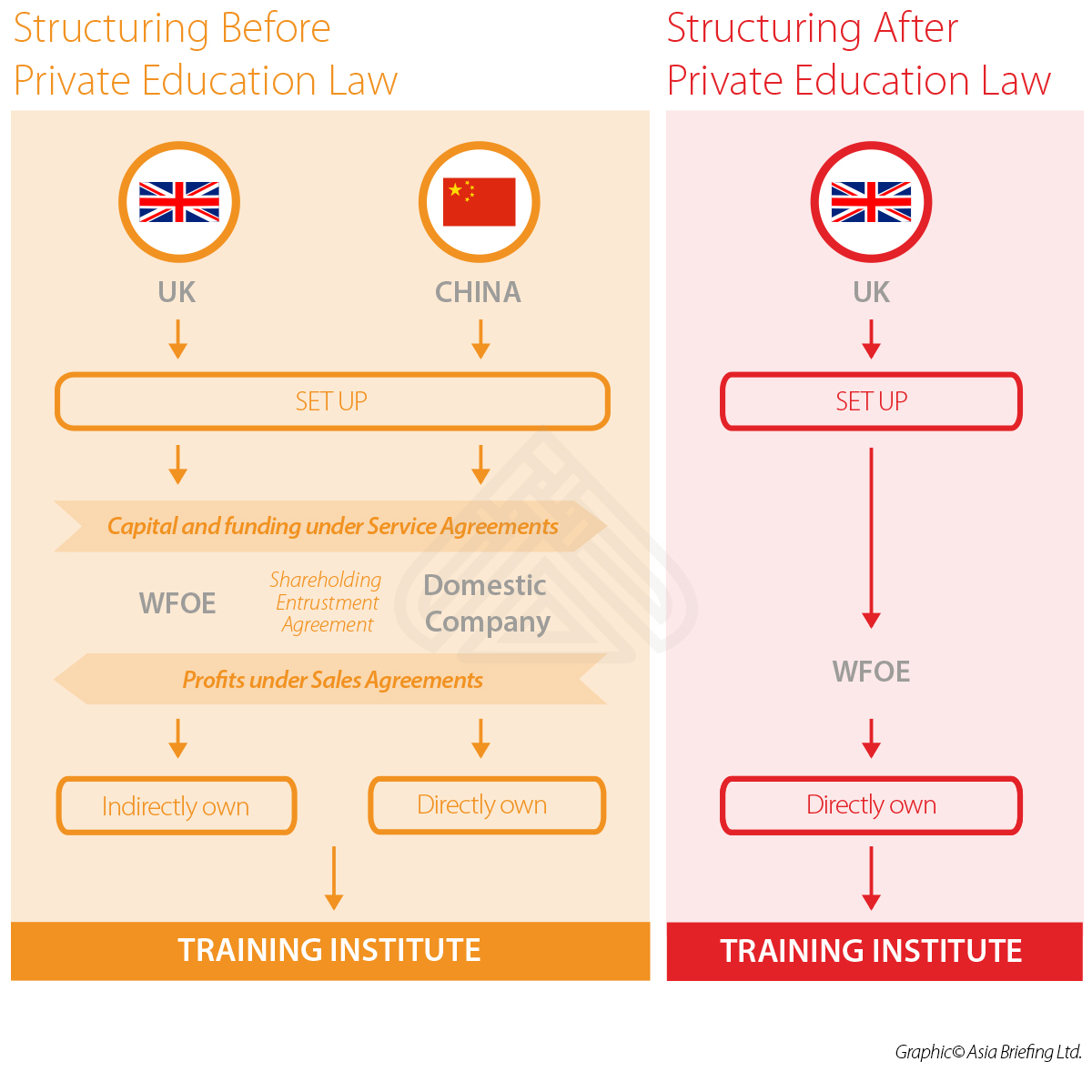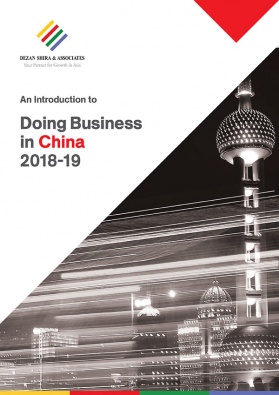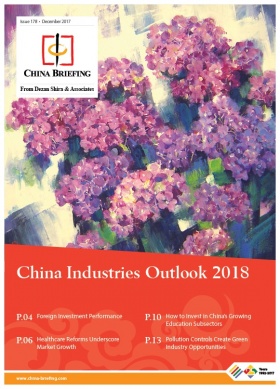How to Invest in China’s Growing Education Subsectors
A series of highly publicized scandals at Chinese preschools rocked the country in recent years, which increased both government and parental scrutiny on private education. Observers were shocked that such maltreatment could occur at well-regarded private preschools in wealthy neighborhoods, including at RYB Education – China’s largest private preschool chain, which is listed on the New York Stock Exchange.
Rather than discouraging participation in private education, however, the scandals underscore the need for more reliable, high-quality schools. And China’s education industry – already enormous – is poised to grow even larger. With the rise of China’s lower tier and inland cities, and a government interested in equipping the workforce for a changing economy, demand for education continues to grow.
Despite high market demand, the education industry remains a sensitive area for foreign investment in China. FDI is either encouraged, restricted, or prohibited depending on the subsector. With increased scrutiny, new laws, and a variety of investment vehicles to consider, investing in China’s lucrative education industry is challenging without a detailed entry strategy.
![]() RELATED: Hong Kong’s New Two-tiered Profits Tax
RELATED: Hong Kong’s New Two-tiered Profits Tax
Education subsector opportunities
China’s education industry is vast and varied, with different opportunities for different demographic subsets and school types. Foreign investors must enter into a joint venture with a Chinese partner for most types of educational institutions, and are prohibited from participating in compulsory education – primary and junior secondary schools for students aged 6-15.
Preschool and early education
Although China’s population is rapidly aging, the recent relaxation of the One Child Policy has increased birth rates at a time when families are better equipped to spend on education.
When launching the One Child Policy reform in late 2015, the government projected that it would lead to an additional 17.2 million new births between 2017 and 2022. With this boom in newborns, China’s preschool education market is expected to grow from RMB 380 billion (US$57.8 billion) in 2016 to over RMB 540 billion (US$82.1 billion) by 2020.
With the recent child abuse scandals at preschools, however, new market entrants will face higher entrance requirements. For example, preschools will have to install surveillance cameras in classrooms, and, in Beijing, government inspectors will be responsible for continually checking in on operations.
After-school tutoring
China’s education system – and the job market upon graduation – is fiercely competitive, which leads many students to enroll in supplementary after-school education to keep up. Chinese families are prepared to spend heavily on education to keep their children competitive with their peers.
Although foreign schools cannot provide education services for compulsory school years, they can set up after-school tutoring schools for additional education. However, given that education during compulsory school years is heavily geared towards preparations for the grueling gaokao standardized exams that determine university placements, curricula is invariably developed to cater to these exams. As a result, foreign education providers have less to differentiate themselves from domestic providers that are more adept at gaokao preparation.
Despite these limitations, there is still space for foreign education services. China is the world’s leading source of international students, with 544,500 Chinese nationals studying abroad in 2016. This means that in addition to preparations for the gaokao, many Chinese students also attend SAT preparation schools and other schools to prepare them for studying overseas.
Additionally, foreign education providers continue to have opportunities in language instruction. Although this sector is mature in China’s first tier cities, there are strong expansion opportunities in lower tier and inland cities. Such schools can cater to both younger students and adult learners.
Vocational education
As China’s economy transitions towards services and higher value-added manufacturing, the country’s workforce needs more technical and specialized training. For example, although China aims to become a world leader in artificial intelligence (AI) and is investing heavily to meet this goal, its workforce has a severe talent shortage in the industry.
This trend can be seen not just in highly technical fields, but also creative ones. China’s garment industry, for instance, is looking to transition from labor-intensive production to higher value product design, but lacks qualified talent.
The Chinese government is aware of the need to upgrade its workforce’s skills and education, and is investing heavily in vocational education to bridge the gap. China has the most vocational training institutes in the world, with nearly 27 million students attending some 12,300 institutes.
But despite the high number of vocational schools, many are low quality and lack teachers who are qualified to instruct these topics. As a result, China is in need of foreign investment to bridge the shortfall, which explains why vocational education is the only educational sector completely open to FDI.
Vocational education providers face their own set of challenges, however. Students at such institutions have high expectations of employment upon graduation, which means that providers must ensure the skills being taught are always up-to-date and relevant for the local business environment.
Further, vocational education carries a stigma of not being as prestigious as academia, particularly given the uneven quality of existing institutions. Foreign vocational schools may do well to highlight their professionalism and expertise for families who see the appeal of foreign education for not just its quality, but also its cachet as a status symbol.
![]() Pre-Investment, Market Entry Strategy Advisory Services from Dezan Shira & Associates
Pre-Investment, Market Entry Strategy Advisory Services from Dezan Shira & Associates
Choosing the right investment vehicle
In addition to ownership restrictions on foreign investors, China’s private education laws set forward a wide range of regulations on how private schools can function. Amendments made in November 2016 to the Promotion of Private Education Law (“the Law”), together with supporting amendments, more clearly differentiate private schools as either non-profit or for-profit.
However, while the amendments, which came into effect on September 1, 2017, banned for-profit private schools from offering compulsory education services, they also provided private schools with more legal clarity for profit-seeking activities.
Before the amendments to the Law, private schools in China were usually set up as non-profit schools. However, foreign investors were able to derive profits from private schools through investment vehicles such as variable interest entity (VIE) structures – VIEs allowed foreign investors to form contracts without holding direct legal ownership. The updates to the law, in addition to legitimating the idea of for-profit private schools, which leads to less regulatory risk, and reduces the potential for disagreements with partners, give for-profit private schools more operational flexibility.
For example, for-profit private schools are now able to set tuition without having to seek government approval; they also operate under more clarity under China’s corporate laws. However, while non-profit schools will still be able to benefit from preferential land use and tax policies, for-profit schools are no longer able to avail of these incentives.
About Us
China Briefing is published by Asia Briefing, a subsidiary of Dezan Shira & Associates. We produce material for foreign investors throughout Asia, including ASEAN, India, Indonesia, Russia, the Silk Road, and Vietnam. For editorial matters please contact us here, and for a complimentary subscription to our products, please click here.
Dezan Shira & Associates is a full service practice in China, providing business intelligence, due diligence, legal, tax, accounting, IT, HR, payroll, and advisory services throughout the China and Asian region. For assistance with China business issues or investments into China, please contact us at china@dezshira.com or visit us at www.dezshira.com
- Previous Article China’s Cybersecurity Law: An Introduction for Foreign Businesspeople
- Next Article Hong Kong’s New Transfer Pricing Regime
